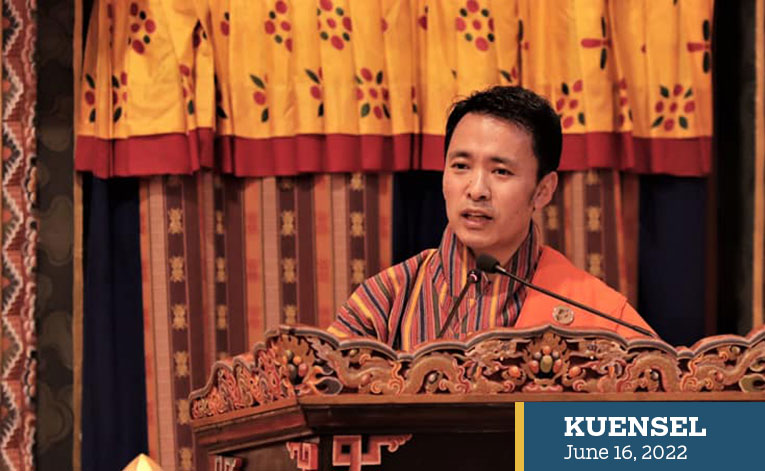Phurpa Lhamo
Dissatisfied with Home Minister Ugyen Dorji’s response on promoting Dzongkha language, the National Council (NC) members decided to have an internal discussion to approach the government.
The minister was quizzed on the government’s stand on having a National Language Act of Bhutan, the government’s plans to preserve, protect and promote Dzongkha, and also on the possibilities of teaching History and Geography subjects in the national language.
Trongsa’s Member of Parliament (MP) Tashi Samdrup said that Dzongkha as the national language was important for national identity, culture, and independence. “His Majesty The Fourth King had commanded to the government officials that any official correspondence should be made in Dzongkha language.” He added that the language was deteriorating over the years.
He cited how many people prefer introducing each other in languages other than Dzongkha.
Home Minister Ugyen Dorji said that the concern over Dzongkha deteriorating was arguable and depended on how an individual viewed the issue.
He pointed out that after decades since Dzongkha was recognised as the national language, Dzongkha is currently learned in schools and spread without regional differences.
He also justified that number of students enrolled at the College of Language and Culture Studies is increasing and students are also required to pass in Dzongkha.
As for English and Dzongkha, Home Minister Ugyen Dorji said that while Dzongkha was equally important as Bhutan’s culture, English was an important language for international changes and development, science, economy and industry.
Being good in English shouldn’t be taken as a threat to Dzongkha or a concern, he said.
Lyonpo Ugyen Dorji said that to preserve, protect, and promote Dzongkha, the Dzongkha Development Committee (DDC) with about 31 staff also developed the National Policy and Strategy of Dzongkha Development and Promotion.
He said DDC also published research and books for Dzongkha and for regional languages, Dzongkha-English dictionary, and grammar and tenses books. Targeted for children, books with illustrations, audio visual contents, animations, and phone applications were also created.
Lyonpo also said that implementing a law against people mixing Dzongkha with other languages would require strict monitoring. He said that an act should be the last resort in solving the issue.
NC members also questioned if there was any possibility for History and Geography subjects to be taught in the national language.
Lyonpo Ugyen Dorji said that when History subject was taught in Dzongkha, several issues arose.
Even if there were experts in History, they couldn’t teach in Dzongkha language and if there were those who spoke and taught in Dzongkha, they did not have the subject knowledge.
He added that while the education ministry didn’t reject the idea, immediate implementation would affect language development.
However, NC Bumthang MP Nima said that while world History could wait, he questioned why Jungrab (Bhutan History) couldn’t be taught in Dzongkha.
He claimed that the assessment of implementation has shown no outcomes and asked the education ministry to respond with a clear answer if it was doable or not.
NC members also suggested making Dzongkha accessible for children between one and six years, claiming children in the age group were exposed to various television contents spoken in English.
Members also stated that the minister’s response wasn’t satisfactory, especially regarding the possibility of teaching Geography and History in Dzongkha.
Haa NC member, Ugyen Namgay, pointed out that the NC requested the government’s stand and not the opinion of an individual from Thrimshing.
Meanwhile, NC members would decide whether to send a written reminder on the issue or discuss it further during the internal meeting.


